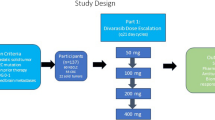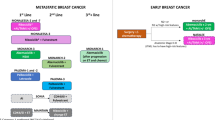Summary
The effects of class I PI3K inhibitor NVP-BKM120 on cell proliferation, cell cycle distribution, cellular apoptosis, phosphorylation of several proteins of the PI3K/AKT signaling pathway and the mRNA expression levels of HIF1-α, VEGF and MMP9 in the acquired gefitinib resistant cell line H1975 were investigated, and whether NVP-BKM120 can overcome the acquired resistance caused by the EGFR T790M mutation and the underlying mechanism were explored. MTT assay was performed to detect the effect of gefitinib, NVP-BKM120, NVP-BKM120 plus 1 μmol/L gefitinib on growth of H1975 cells. The distribution of cell cycle and apoptosis rate of H1975 cells were examined by using flow cytometry. The mRNA expression levels of tumor-related genes such as HIF1-α, VEGF and MMP9 were detected by using real-time quantitative PCR. Western blotting was used to detect the expression level of phosphorylated proteins in the PI3K/AKT signaling pathway, such as Ser473-p-AKT, Ser235/236-p-S6 and Thr70-p-4E-BP1, as well as total AKT, S6 and 4E-BP1. The results showed that the NVP-BKM120 could inhibit the growth of H1975 cells in a concentration-dependent manner, and H1975 cells were more sensitive to NVP-BKM120 than gefitinib (IC50:1.385 vs. 15.09 μmol/L respectively), whereas combination of NVP-BKM120 and gefitinib (1 μmol/L) did not show more obvious effect than NVP-BKM120 used alone on inhibition of cell growth (P>0.05). NVP-BKM120 (1 μmol/L) increased the proportion of H1975 cells in G0-G1 phase and the effect was concentration-dependent, and 2 μmol/L NVP-BKM120 promoted apoptosis of H1975 cells. There was no significant difference in the proportion of H1975 cells in G0-G1 phase and apoptosis rate between NVP-BKM120-treated alone group and NVP-BKM120 plus genfitinib (1 μmol/L)-treated group or between DMSO-treated control group and gefitinib (1 μmol/L)-treated alone group (P>0.05 for all). It was also found that the mRNA expression levels of these genes were down-regulated by NVP-BKM120 (1 μmol/L), and NVP-BKM120 (1 μmol/L) or NVP-BKM120 (1 μmol/L) plus gefitinib (1 μmol/L) obviously inhibited the activation of Akt, S6 and 4E-BP1 as compared with control group, but single use of gefitinib (1 μmol/L) exerted no significant effect. These data suggested that NVP-BKM120 can overcome gefitinib resistance in H1975 cells, and the combination of NVP-BKM120 and gefitinib did not have additive or synergistic effects. It was also concluded that NVP-BKM120 could overcome the acquired resistance to gefitinib by down-regulating the phosphorylated protein in PI3K/AKT signal pathways in H1975 cells, but it could not enhance the sensitivity of H1975 cells to gefitinib.
Similar content being viewed by others
References
Jemal A, Siegel R, Xu J, et al. Cancer statistics, 2010. CA Cancer J Clin, 2010,60(5):277–300
Jeremic B, Milicic B, Dagovic A, et al. Pretreatment clinical prognostic factors in patients with stage IV non-small cell lung cancer (NSCLC) treated with chemotherapy. J Cancer Res Clin Oncol, 2003,129(2): 114–122
Wakelee HA, Bernardo P, Johnson DH, et al. Changes in the natural history of nonsmall cell lung cancer (NSCLC)-comparison of outcomes and characteristics in patients with advanced NSCLC entered in Eastern Cooperative Oncology Group trials before and after 1990. Cancer, 2006,106(10):2208–2217
Molina JR, Yang P, Cassivi SD, et al. Non-small cell lung cancer: epidemiology, risk factors, treatment, and survivorship. Mayo Clin Proc, 2008,83(5):584–594
Pfister DG, Johnson DH, Azzoli CG, et al. American Society of Clinical Oncology treatment of unresectable non-small-cell lung cancer guideline: updated 2003. J Clin Oncol, 2004,22(2):330–353
Shepherd FA, Dancey J, Ramlau R, et al. Prospective randomized trial of docetaxel versus best supportive care in patients with non-small-cell lung cancer previously treated with platinum-based chemotherapy. J Clin Oncol, 2000,18(10):2095–2103
Idbaih A, Aimard J, Boisselier B, et al. Epidermal growth factor receptor mutations in lung cancer. J Neuropathol Appl Neurobiol, 2009,35(2):208–213
Ettinger DS. Clinical implications of EGFR expression in the development and progression of solid tumors: focus on non-small cell lung cancer. Oncologist, 2006,11(4): 358–373
Sharma SV, Bell DW, Settleman J, et al. Epidermal growth factor receptor mutations in lung cancer. Nat Rev Cancer, 2007,7(3):169–181
Paez JG, Jänne PA, Lee JC, et al. EGFR mutations in lung cancer: correlation with clinical response to gefitinib therapy. Science, 2004,304(5676):1497–1500
Costa DB, Kobayashi S, Tenen DG, et al. Pooled analysis of the prospective trials of gefitinib monotherapy for EGFR-mutant non-small cell lung cancers. Lung Cancer, 2007,58(1):95–103
Kobayashi S, Boggon TJ, Dayaram T, et al. EGFR mutation and resistance of non-small cell lung cancer to gefitinib. N Engl J Med, 2005,352(8):786–792
Pao W, Miller VA, Politi KA, et al. Acquired resistance of lung adenocarcinomas to gefitinib or erlotinib is associated with a second mutation in the EGFR kinase domain. PLoS Med, 2005,2(3):e73
Yun CH, Mengwasser KE, Toms AV, et al. The T790M mutation in EGFR kinase causes drug resistance by increasing the affinity for ATP. Proc Natl Acad Sci USA, 2008,105(6):2070–2075
Engelman JA, Zejnullahu K, Mitsudomi T, et al. MET amplification leads to gefitinib resistance in lung cancer by activating ERBB3 signaling. Science, 2007,316(5827): 1039–1043
Bean J, Brennan C, Shih JY, et al. MET amplification occurs with or without T790M mutations in EGFR mutant lung tumors with acquired resistance to gefitinib or erlotinib. Proc Natl Acad Sci USA, 2007,104(52): 20932–20937
Buonamici S, Williams J, Morrissey M, et al. Interfering with resistance to smoothened antagonists by inhibition of the PI3K pathway in medulloblastoma. Sci Transl Med, 2010,2(51):51–70
Aziz SA, Jilaveanu LB, Zito C, et al. Vertical targeting of the phosphatidylinositol-3 kinase pathway as a strategy for treating melanoma. Clin Cancer Res, 2010,16(24): 6029–6039
Gendreau SB, Ventura R, Keast P, et al. Inhibition of the T790M gatekeeper mutant of the epidermal growth factor receptor by EXEL-7647. Clin Cancer Res, 2007,13(12): 3713–3723
Tang Z, Du R, Jiang S, et al. Dual MET-EGFR combinatorial inhibition against T790M-EGFR-mediated erlotinib-resistant lung cancer. Br J Cancer, 2008,99(6): 911–922
Rho JK, Choi YJ, Ryoo BY, et al. P53 enhances gefitinib-induced growth inhibition and apoptosis by regulation of Fas in non-small cell lung cancer. Cancer Res, 2007,67(3):1163–1169
Schmittgen TD, Livak KJ. Analyzing real-time PCR data by the comparative CT method. Nat Protoc, 2008,3(6): 1101–1108
Wang L, Zhang Q, Zhang J, et al. PI3K pathway activation results in low efficacy of both trastuzumab and lapatinib. BMC Cancer, 2011,11:248
Nicholson KM, Anderson NG. The protein kinase B/Akt signaling pathway in human malignancy. Cell Signal, 2002,14(5):381–395
Engelman JA, Luo J, Cantley LC. The evolution of phosphatidylinositol 3-kinases as regulators of growth and metabolism. Nat Rev Genet, 2006,7(8):606–619
Aziz SA, Davies M, Pick E, et al. Phosphatidylinositol-3-kinase as a therapeutic target in melanoma. Clin Cancer Res, 2009,15(9):3029–3036
Martin KA, Blenis J. Coordinate regulation of translation by the PI 3-kinase and mTOR pathways. Adv Cancer Res, 2002,86:1–39
Richardson CJ, Schalm SS, Blenis J. PI3-kinase and TOR: PIKTORing cell growth. Semin Cell Dev Biol, 2004,15 (2):147–159
Kubo T, Yamamoto H, Lockwood WW, et al. MET gene amplification or EGFR mutation activate MET in lung cancers untreated with EGFR tyrosine kinase inhibitors. Int J Cancer, 2009,124(8):1778–1784
Testa JR, Bellacosa A. AKT plays a central role in tumorigenesis. Proc Natl Acad Sci USA, 2001,98(20):10 983–10 985
Hanada M, Feng J, Hemmings BA. Structure, regulation and function of PKB/AKT-a major therapeutic target. Biochim Biophys Acta, 2004,1697(1-2):3–16
Gao N, Nester RA, Sarkar MA. 4-Hydroxy estradiol but not 2-hydroxy estradiol induces expression of hypoxia-inducible factor 1alpha and vascular endothelial growth factor A through phosphatidylinositol 3-kinase/ Akt/FRAP pathway in OVCAR-3 and A27802CP70 human ovarian carcinoma cells. Toxicol Appl Pharmacol, 2004,196(1):124–135
Laughner E, Taghavi P, Chiles K, et al. HER2 (neu) signaling increases the rate of hypoxia-inducible factor 1alpha (HIF-1alpha) synthesis: novel mechanism for HIF-1-mediated vascular endothelial growth factor expression. Mol Cell Biol, 2001,21(12):3995–4004
Author information
Authors and Affiliations
Corresponding author
Additional information
This project was supported by grants from the Wu Jieping Medical Foundation of China (No. 320-6700-09069), the Hubei Provincial Natural Science Foundation of China (No. 2010CDB07702), and Novartis International AG. (Received Mar. 29, 2013; revised Oct. 26, 2013)
Rights and permissions
About this article
Cite this article
Liang, Yc., Wu, Hg., Xue, Hj. et al. Effects of PI3K inhibitor NVP-BKM120 on acquired resistance to gefitinib of human lung adenocarcinoma H1975 cells. J. Huazhong Univ. Sci. Technol. [Med. Sci.] 33, 845–851 (2013). https://doi.org/10.1007/s11596-013-1209-5
Received:
Revised:
Published:
Issue Date:
DOI: https://doi.org/10.1007/s11596-013-1209-5




